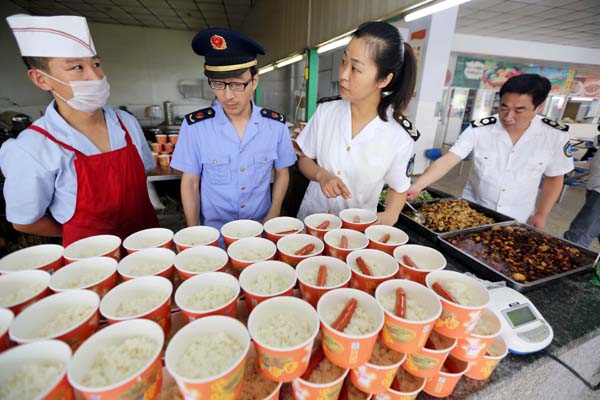 |
|
Food safety administration staff inspect a school canteen in Huaibei, Anhui province. The quality and safety of foods has a wide impact not just in China but across the world. [Photo provided to China Daily] |
China's Center for Food Safety Risk Assessment is to work with the US Pharmacopeial Convention, a global health organization that sets standards for medicines and food ingredients, on developing lab-based training courses for food safety.
The courses will become part of the World Bank's Global Food Safety Partnership, an initiative dedicated to improving the safety of food in middle-income and developing countries by promoting a globally-coordinated and locally-driven food safety approach through effective international collaboration on food safety.
"The training courses will cover a series of subjects such as microbiology and physicochemical knowledge, and will be developed for worldwide use," says Chen Junshi, chief adviser at CFSA, who is also a member of the Chinese Academy of Engineering.
Chen says the US convention has wide experience of setting standards for food quality, while the CFSA has better understanding of conditions in China, and that the collaboration will leverage both sides' resources and play an important role in improving global food safety.
It is not the first time the two have partnered. Earlier this year, they worked together to translate the Food Chemicals Codex 7, science-based testing standards and specifications for food ingredients, into Chinese. The FCC was then published by USP. The two have also collaborated on a series of workshops and training courses in China.
"Food safety issues exist all over the world. Solving them require many related industries to work together," said Markus Lipp, USP's senior director of food ingredients.
In response to the growing number of legal cases involving food fraud, USP recently launched a guidance document on how companies and regulators could protect themselves against cases, particularly those involving ingredients.
This guidance is to serve as a common reference point to food fraud discussions, says Lipp, whether the focus is on the economic impact or public health aspects.
"It is becoming more common for the ingredients of our food to travel through increasingly longer and more complex supply chains. Helping ensure and confirm the integrity of food ingredients throughout is becoming more and more needed to protect consumers and brands from food fraud," Lipp told delegates at the recent China International Food Safety and Quality Conference & Expo in Shanghai.
Chen Junshi said that the quality and safety of foods and medicines has a wide impact not just in China but across the world.
"More cooperative activities, such as knowledge sharing and impactful conversations should be made in future to address food safety and fraud issues."
More cooperative activities, such as knowledge sharing and impactful conversations should be made in future to address food safety and fraud issues."
